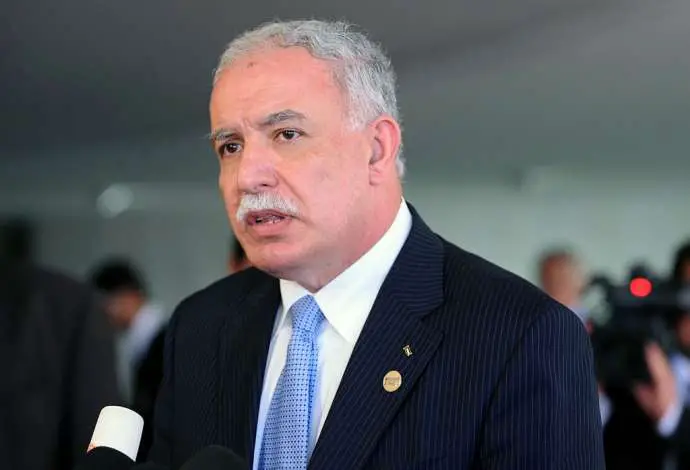STA, 11 July 2019 - Palestinian Foreign Minister Riad Malki told the STA he was optimistic about Slovenia recognising Palestinian independence, expecting Slovenia to make this step along with a number of other EU countries. However, he pointed out there was currently little chance of restarting the peace process with Israel.
Malki said he was disappointed when Slovenia changed its mind about recognising Palestine last year after the decision to do that had already been reached.
"I remember we were in Brussels when the former foreign minister met with our President Mahmud Abas and told him Slovenia was going to recognize Palestine," said the minister, adding that they were very pleased about the step and started celebrating, but Slovenia decided to take a step back.
Palestinian expectations then became more realistic, with Palestine starting to understand the complexity of this process and also the effects of the pressure from Israel and the US.
Wednesday's talks with Foreign Minister Miro Cerar and Speaker Dejan Židan made Malki realise that together they could create the right kind of atmosphere for reaching the recognition decision.
He said that in the upcoming weeks he would strengthen the efforts aimed at establishing conditions in which Slovenia could recognize Palestinian independence along with several other EU countries, adding that would be beneficial to all, "not only Slovenia but also for other countries who are a little bit hesitant and who are looking for other countries to do the same".
According to him, Palestinians would deeply appreciate Slovenian recognition of their independence also because they regard Slovenia as "a country which understands what it means to be independent and has strived for its own freedom and independence", as well as a country which has supported Palestine since its own independence.
"The moment Slovenia will announce its recognition of the state of Palestine, it's going to be a national celebration in Palestine," said Malki.
Meanwhile, the Palestinian minister is not particularly optimistic in terms of the peace process in the Israeli-Palestinian conflict.
As long as Israel will have a "fascist, extreme right, radical government" and as long as the US administration will continue supporting this government and illegal settlers and disregarding international law and UN resolutions, there are no chances of restarting the process, said Malki.
According to him, Palestinians would support the replacement of the US as a mediator in the process; however, they are aware that the US cannot be completely excluded from the negotiations. But they cannot have an exclusive role any more, said Malki.
He called for a bigger role of the EU in the negotiations. According to him, Europe understands the Middle East situation and has "vested interests to see peace and prosperity in the Middle East".
However, Malki believes Israel would not accept that. "Israel wants the US alone to play that role, but we cannot allow that, so we have to reach a compromise," said the minister, adding that such compromise could include the US, EU and other countries as participants in the negotiations.
Malki described the situation in the occupied Palestinian territories as very difficult, highlighting that such state of affairs has been going on for more than 50 years.
According to him, the Israeli occupation is not only military but also economic and social.
"You cannot dig a well without getting Israeli permits. You cannot get electricity without Israeli permits. Our internet - we get it directly from Israel," said Malki, pointing out that Palestinians only recently got 3G, when people in some places already have 5G, while in Gaza only the 2G network is available.
"If we want to travel abroad, we have to go through Israeli military control. If they decide you're not allowed to travel, then you cannot really go anywhere. There are more than 600 checkpoints dispersed around in the West Bank, meaning that on average there is a checkpoint every four or five kilometres."
Malki pointed out that if one travels from one city to another, a distance of some 30 km, they have to go through 2-3 checkpoints. "You don't know if you can cross, you don't know if you can get where you are going on time."
"You go to sleep and you don't know if Israeli soldiers will break into your home at 3 or 4 in the morning just to remind you they're the ones in control or to look for somebody or something or even to take one of your children for interrogation.
"When your kids leave in the morning for school, you don't know if they will come back," said Malki and added that Jewish settlers, pushing Palestinians off their land make life in the occupied territories even harder.






